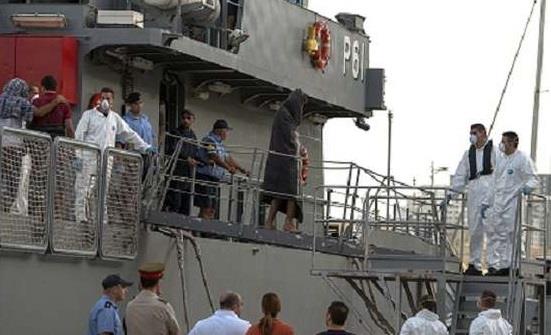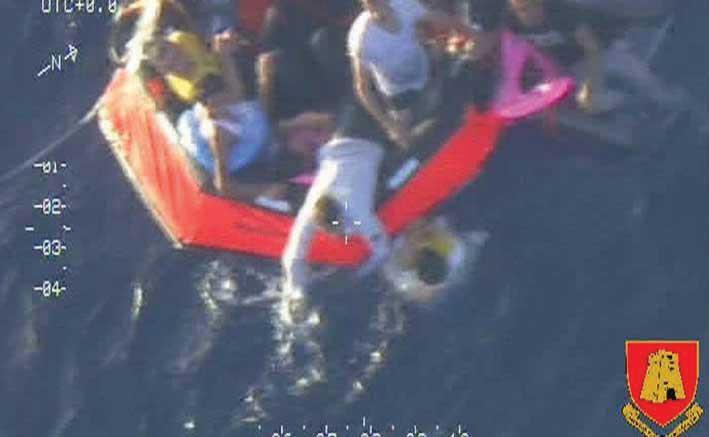The Rome prosecutor’s office is seeking manslaughter charges against two officials, one from the navy and another from the coast guard, over the 11 October 2013 migrant tragedy, which claimed the lives of almost 300 Syrian refugees.
Malta was also involved in the botched rescue attempt, which happened in the Maltese search and rescue area. Many of the 268 victims were women and children. Another 212 Syrians had been rescued by the Italian and Maltese navies in what was one of the worst cases witnessed in the Mediterranean. According to available information, which was also analysed by The Malta Independent, the tragedy could have been avoided.
According to Italian news outlet La Stampa, the prosecutor’s office has requested a trial for commander Leopoldo Manna of the Guardia Costiera’s operations room, and Luca Licciardi of the Marina Militare’s operations room, over charges of dereliction of duty and manslaughter.
Prosecutors Francesco Scavo and Santina Lionetti had been investigating how the Italian forces had responded on that fateful day and are now seeking to take the case to trial.
Their investigation follows a judge’s refusal to stop the investigation. The judge, Giovanni Giorganni, had ordered the forced imputation of Licciardi and Manna and ordered further investigations in relation to the position of Catia Pellegrino, commander of the Italian Navy ship ITS Libra at the time of the events.
The judge had asserted that Manna and Licciardi, who were in charge of their respective units, had taken all the decisions.

Tragedy could have been averted or contained
The two officers claimed to have acted on the basis of assurance by Malta that it would dispatch an airplane and a patrol boat and said the migrants only came in danger when the boat rolled over, La Stampa reports.
But the investigating judge was not convinced by these arguments, saying that failure to comply with Malta’s request sent at 16:22pm, which was repeated 20 minutes later, and the fact that the Libra was only dispatched to the scene after the boat rolled over and sank were “unjustifiable.”
It is clear that the Libra could have reached the migrant boat before it rolled over, or at least at a time when the consequences could have been contained had the order to proceed to the area at full steam been given, the judge noted.
But the order was given only at 17:14, after the Italians were informed that the boat had turned turtle.
The hearing to examine the request to bring manslaughter charges against the officers has been set for February 16.
While an investigation into the tragedy was launched in Italy, no such thing can be said for Malta.
The migrants on board the dilapidated vessel, which had boarded at the Libyan port of Zuwara, had called for help when the boat was some 113 kilometres from the Italian island of Lampedusa and 218 kilometres from Malta, in Maltese territorial waters.
They had told the Italians that the old fishing vessel had been holed by machinegun fire from a Libyan patrol boat and was taking in water.
One of the men on board, a doctor called Jammo, said he had first called the Italians at 11am and was promised that help was on the way. Two hours later he was curtly asked to call Malta.
Malta had taken over control of the operation by 1pm.

Malta’s six options
An Italian admiral had told L’Espresso, which had also investigated the case, that Malta was alerted to the presence of merchant vessels in the vicinity of the stricken migrant boat. An alert was sent out to all merchant vessels in the area but none responded. It is unclear whether Malta asked any of those vessels to attend to the migrant boat.
Admiral Felicio Angrisano, General Commander of the Rome Maritime Rescue Coordination Centre, had also said that Malta was told that the ITS Libra was 50km away from the boat. But for some reason the navy vessel was not asked to assist and kept patrolling at slow speed for the next five hours.
Malta finally requested the Libra to assist the migrants at around 17:10pm, when the migrant boat capsized, and only reached the area at 6pm. By that time many had drowned.
This newspaper had reported how Malta had had a number of available options but for unclear reasons chose the option that took the longest time to execute.
It could have dispatched merchant vessels, the ITS Libra, Italian coast guard and Guardia di Finanza fast boats from Lampedusa, and a number of fishing trawlers that were operating in the area. The sixth option was going it alone. Ultimately, Malta took the sixth option, keeping all the nearby assets on standby.
The Maltese authorities sent a plane and the P61 offshore patrol vessel, which arrived at the scene at 17:51pm. By then, the migrants had been in the water for around 40 minutes.
The Italian Admiral had said that after the migrant boat finally sank, the Maltese authorities asked Italy for help and at this time the fleet available for rescue included one Maltese patrol boat, the ITS Libra, boats from the Guardia di Finanza and from the Guardia Costiera, two Italian fishing boats that were already in the area and a merchant ship that was re-routed by Malta.
This further confirms that there were various options available, with a number of vessels that could have at least helped the migrants until the Maltese patrol boat arrived.
When asked why the Italians had not responded to the crisis earlier, the Italian Admiral replied that the Maltese were in charge and the Italians could not intervene before receiving orders to do so.
Further fuelling speculation about the way events unfolded on that fateful day, the Maltese government and the Armed Forces of Malta have always refused to answer any questions about the incident from the Maltese and foreign media.